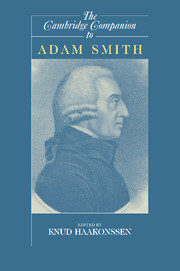Book contents
- Frontmatter
- Introduction: The Coherence of Smith’s Thought
- 1 Imagination: Morals, Science, and Arts
- 2 Adam Smith, Belletrist
- 3 Adam Smith’s Theory of Language
- 4 Smith and Science
- 5 Smith on Ingenuity, Pleasure, and the Imitative Arts
- 6 Sympathy and the Impartial Spectator
- 7 Virtues, Utility, and Rules
- 8 Adam Smith on Justice, Rights, and Law
- 9 Self-Interest and Other Interests
- 10 Adam Smith and History
- 11 Adam Smith’s Politics
- 12 Adam Smith’s Economics
- 13 The Legacy of Adam Smith
- Bibliography
- Index
5 - Smith on Ingenuity, Pleasure, and the Imitative Arts
Published online by Cambridge University Press: 28 August 2006
- Frontmatter
- Introduction: The Coherence of Smith’s Thought
- 1 Imagination: Morals, Science, and Arts
- 2 Adam Smith, Belletrist
- 3 Adam Smith’s Theory of Language
- 4 Smith and Science
- 5 Smith on Ingenuity, Pleasure, and the Imitative Arts
- 6 Sympathy and the Impartial Spectator
- 7 Virtues, Utility, and Rules
- 8 Adam Smith on Justice, Rights, and Law
- 9 Self-Interest and Other Interests
- 10 Adam Smith and History
- 11 Adam Smith’s Politics
- 12 Adam Smith’s Economics
- 13 The Legacy of Adam Smith
- Bibliography
- Index
Summary
SMITH’S PREOCCUPATION WITH THE IMITATIVE ARTS
After Smith returned to Kirkaldy from London in June 1777, one of “Several Works” that occupied him was an essay on the imitative arts (Corr., no. 208). Progress was interrupted, as he feared it would be, by his duties, from January 1778, as a Commissioner of His Majesty's Customs for Scotland. Nonetheless, he returned to this particular essay as time allowed, maintaining his interest in the subject right up to his last days.
Twice in the 1780s that we know of, Smith laid out his ideas before competent audiences on what it is about imitation in the arts that gives pleasure. In the summer of 1782, at a meeting in London of the Johnson literary club, he conversed on this theme. The painter Sir Joshua Reynolds was present, told Smith afterward that he perfectly agreed with his notions, and subsequently wrote to his friend Bennet Langton that the subject was clearly one Smith had “considered with attention.” Then, in December 1788, when Smith was in Glasgow for his investiture as Rector of the University, he addressed the Literary Society there, reading a paper of two hours length, on the same subject. The essay remained incomplete at that late date, and it is doubtful whether Smith was able to add much to it before he died. Nonetheless, that he considered his ideas worth preserving may be inferred from the fact that he spared this essay, along with the “History of Astronomy,” and several others, from the destruction he ordered of his lecture notes and other manuscript materials a week or so before his death.
- Type
- Chapter
- Information
- The Cambridge Companion to Adam Smith , pp. 136 - 157Publisher: Cambridge University PressPrint publication year: 2006
- 3
- Cited by



